Pair of massive great white sharks surface off Florida coast within a minute of each other
A pair of massive, 13-foot adult male great white sharks popped up within minutes of each other off the Florida coast earlier this week.
Bob, a 1,300-pound white shark, surfaced Tuesday, March 19, at 12:45 a.m. ET in the waters northeast of Jacksonville; then Breton, a 1,400-pound great white shark, was located slightly northeast of Bob at 12:46 a.m. ET Tuesday, according to nonprofit research group OCEARCH, which tracks sharks.
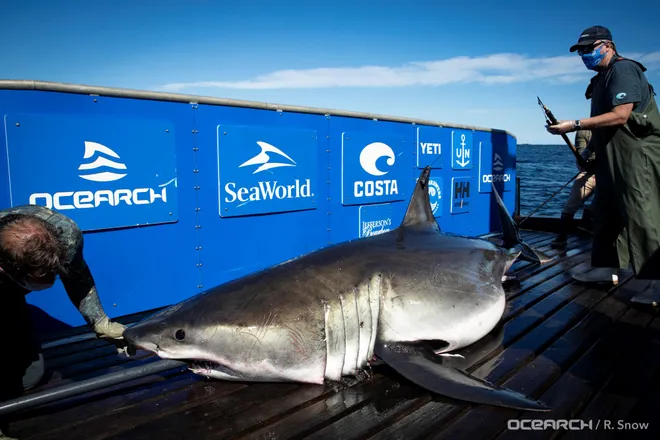
The sharks send off a "ping" when their dorsal fins break the water's surface long enough to transmit a signal from satellite tags OCEARCH attached on them.
The pair's arrival comes ahead of most sharks' impending trip north with the arrival of spring and warmer waters in the Atlantic Ocean. And they popped up just days after a 10-foot long great white shark named Penny made an appearance off the west coast of Florida on Sunday, March 17, at 11: 01 a.m. ET.
Rare snake find:Snake with two heads undergoes surgery to remove ovaries. See the 'Two-headed gal'
Since OCEARCH tagged Penny in April 2023 off of Ocracoke, North Carolina, the shark has traveled more than 5,300 miles up the East Coast into Canadian waters in the Gulf of St. Lawrence, then south to Florida in the fall.
Penny has been traveling around the Florida Keys since the first of the year, according to OCEARCH.
These three sharks are among the nearly 400 the non-profit has tagged to track their oceanic travels. As part of its ocean conservation mission, the group also tags seals, dolphins and turtles.
Great white shark Breton makes 'self portrait' with his travels
Breton sent another ping about 11 hours later on Tuesday at 12:05 p.m. ET off the coasts of South Carolina and Georgia. The first shark tagged during OCEARCH's 2020 expedition in Nova Scotia, Breton was 13 feet, 3 inches long and weighed in at a whopping 1,437 pounds.
Breton was named by SeaWorld, an OCEARCH partner, for the people of Cape Breton where it was tagged.
Breton' previous travels, represented by his OCEARCH pings between September 2020 and January 2022, look like the outline of the body of a shark, with the tail in Nova Scotia and head pointed at Florida's east coast.
"You can track Breton, the white shark that made this self-portrait on the OCEARCH Global Shark Tracker," the research group posted on X, formerly Twitter.
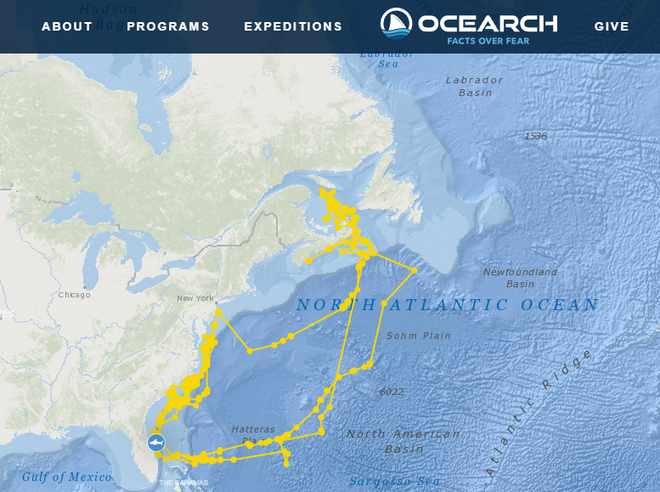
More about Bob, the great white shark
Bob hasn't pinged again, so he and Breton may not be considered traveling "buddies" like Simon and Jekyll, two great whites that traveled 4,000 miles together last year.
Bob measured 13 feet 4 inches and weighed 1,308 pounds when OCEARCH tagged him in Nova Scotia in September of 2021. He was named for OCEARCH chief scientist Dr. Robert (Bob) Hueter, a pioneer in shark science for over 40 years.
"We’ll be following the journeys of both Bob the shark and Dr. Bob Hueter as they continue to help us grow in the world of science for the betterment of our sharks and our oceans," a note on Bob's OCEARCH tracker page reads.
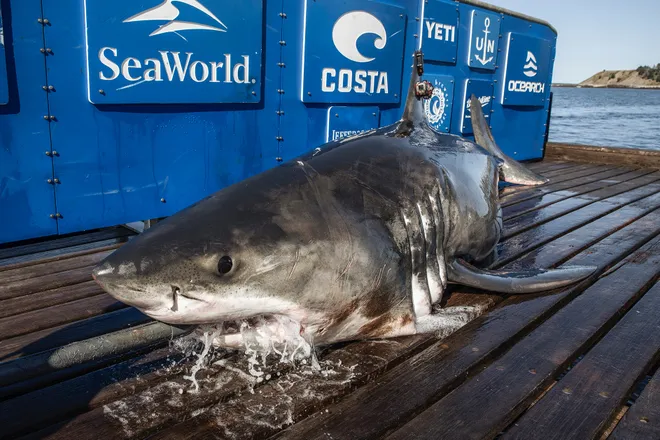
Other sharks on the move around Florida, Carolinas include Rose, Anne Bonny
Anne Bonny, a great white measuring 9 feet 2 inches, pinged on Friday at 5:03 a.m. ET in waters off the coast of South Carolina.
Tagged on April 23, 2023 by OCEARCH in the waters near Ocracoke, North Carolina, Anne Bonny spent summer in the waters around Nova Scotia before heading south in November 2023. The shark has been off the Carolinas' coasts since about Thanksgiving.
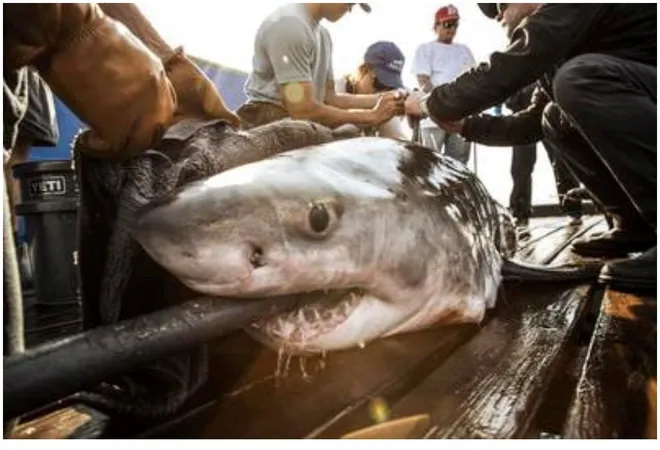
Another great white shark, this one's name is Rose, popped up on the southwest coast off Florida two weeks ago, according to OCEARCH. The 10-foot, 5-inch shark, tagged in 2020, has traveled from the east coast of the state where it pinged several times last month.
Why are so many great white sharks around Florida?
It's not unusual for a grouping of white sharks around Florida and the Gulf in the winter. During the overwintering period (Dec,1 to May 15) many of the white sharks tracked by OCEARCH spend their time from the Outer Banks of North Carolina down the east coast of Florida and into the Gulf of Mexico, the research group told USA TODAY.
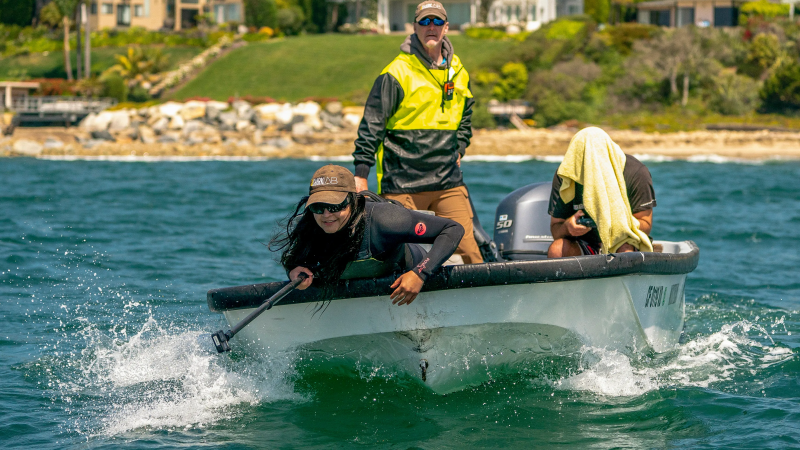
They swim south when the water gets too cold for them and they lack food sources up north, OCEARCH chief scientist Bob Hueter previously told the USA TODAY Network. "A lot of these white sharks, most of them actually, tend to kind of come down, they don't really hug the coast in the sense that they're right on the beach, but they stay in the continental shelf waters, most of them and they come south," Hueter told the Fort Myers News-Press, part of the USA TODAY Network, in March 2023."
OCEARCH research has found a pattern of about half of their tagged sharks head to the Gulf of Mexico, he said.
"We don't really know what they're feeding on. There's some reason to believe that they're going for schools of fish, like amberjack, that are found in great numbers in the Gulf this time of year.," Hueter said. "There's not too much in the way of marine mammals out there compared to up north, so the occasional whale that's dead and floating but probably mostly fish."
Contributing: Kinsey Crowley, Samantha Neely, Dan Radel and Jennifer Sangalang
Follow Mike Snider on X and Threads: @mikesnider & mikegsnider.
What's everyone talking about? Sign up for our trending newsletter to get the latest news of the day
Disclaimer: The copyright of this article belongs to the original author. Reposting this article is solely for the purpose of information dissemination and does not constitute any investment advice. If there is any infringement, please contact us immediately. We will make corrections or deletions as necessary. Thank you.



